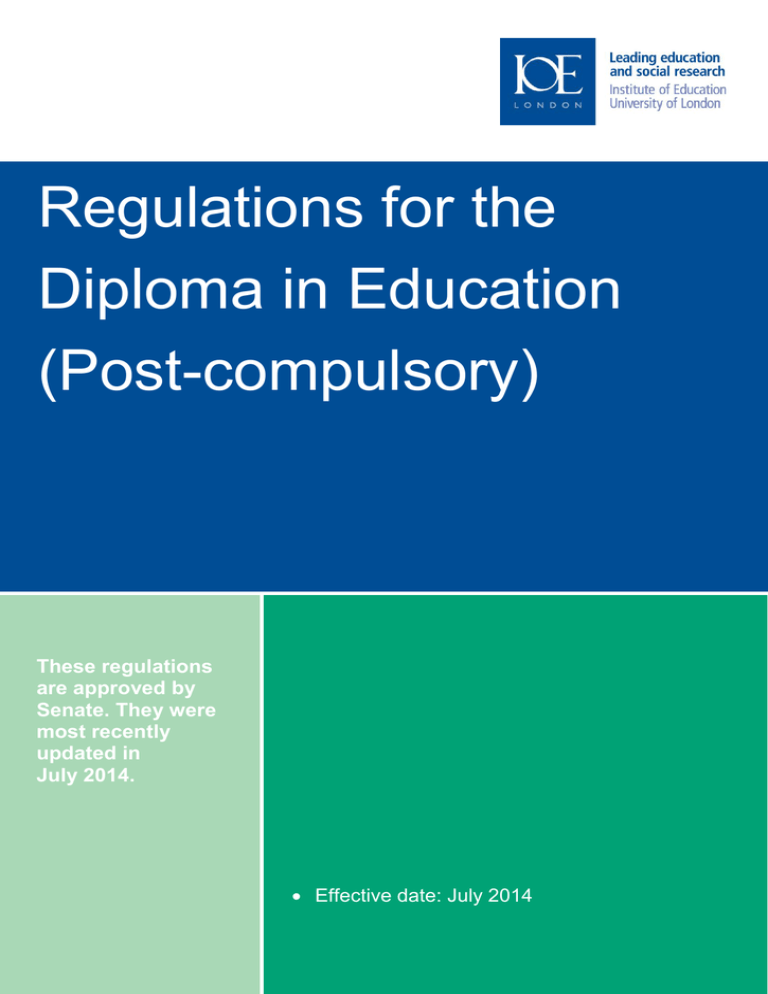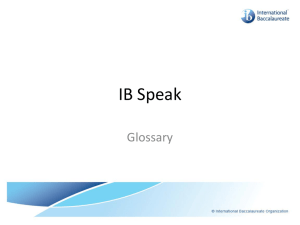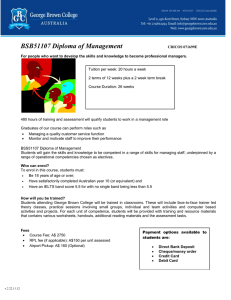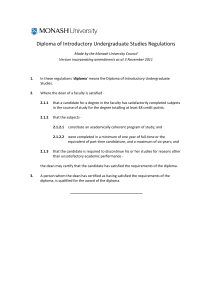Regulations for the Diploma in Education (Post-compulsory)
advertisement

Regulations for the Diploma in Education (Post-compulsory) These regulations are approved by Senate. They were most recently updated in July 2014. Effective date: July 2014 T Institute of Education, University of London Regulations for the Diploma in Education (Post-compulsory) Version 3 Effective from July 2014 2 1 Introductory 1.1 These Regulations govern the conduct and award of the pre- and in-service Diploma in Education and the Diploma in Education: Mathematics (Numeracy). 1.2 The Regulations are made subject to the General Academic Regulations of the Institute, the Regulations for the Assessment of Students and all other appropriate regulations, policies and procedures of the Institute. 2 Definitions 2.1 In these Regulations, terms have the meanings indicated below unless otherwise stated in the text: Compulsory course/module A course or module that is a mandatory part of the programme of studies being undertaken by the student Department for Business, Innovation and Skills (BIS) The department of state for the time being responsible for the education and training of teachers in the Further Education sector. The term Secretary of State means the head of this department. General Academic The General Academic Regulations of the Regulations Institute in force for the time being Level 5 Lifelong Learning UK (LLUK) Intermediate level as nationally indicated at the time these Regulations were approved The independent employer-led sector skills council responsible for the development of staff working in the UK lifelong learning sector PTTLS Preparing to Teach in Lifelong Learning Sector award QTLS Qualified Teacher, Learning and Skills, Status Regulations for the The Regulations for the Assessment of Students Assessment of of the Institute in force for the time being Students 3 Admissions 3.1 In order to be admitted to the pre- or in-service Diploma in Education, or to the Diploma in Education: Mathematics (Numeracy), a candidate shall 3 normally: 3.1.1 On entry, possess either: (a) Qualifications at level 3 or level 4 of the National Qualifications Framework in the subject the candidate intends to teach. This could take the form of A-Level qualifications, Level 3 NVQs, or a Certificate in Higher Education. Candidates for the Diploma in Education: Mathematics must additionally demonstrate that they hold the LLUK level 3 entry criteria for Mathematics, or: (b) An overseas qualification judged by the Institute to be of an equivalent standard; 3.1.2 Demonstrate the capability to meet the required Standards as laid out by BIS by the end of the training and possess the appropriate personal and intellectual qualities for the course; 3.1.3 Demonstrate the potential to read effectively, to communicate clearly and accurately in spoken and written standard English by the end of the training and demonstrate reasonable numeracy and ICT skills; 3.1.4 Demonstrate that s/he has not previously been excluded from teaching or working with children and that there is nothing in his/her previous conduct that would put children or young people at risk or would indicate a lack of suitability for the teaching profession. Candidates for the pre-service Diploma and the Diploma in Education: Mathematics (Numeracy) must provide an Enhanced Disclosure from the Criminal Records Bureau if they have been living in the UK, or an appropriate alternative if they have been living outside the UK. The employing college is responsible for obtaining this information for candidates for the in-service Diploma; 3.1.5 Demonstrate that s/he matches the Secretary of State's requirements for physical and mental fitness to teach. This will be assessed through submission of a confidential health questionnaire for consideration by appropriately qualified Occupational Health personnel for candidates on the pre-service Diplomas, and will be the responsibility of the employing college for those on the in-service Diploma; 3.1.6 Attend a group and/or individual interview and perform satisfactorily in the judgment of the interviewer(s); 3.2 Candidates for the pre-service Diploma must additionally complete and pass an initial assessment in respect of refugee status, to be carried out by the Reconnect Group. To qualify under this assessment candidates must be asylum seekers who have been recognised as refugees under the Geneva Convention or have been granted Humanitarian protection and Discretionary Leave to Remain (formerly known as Exceptional Leave to Remain) or have obtained indefinite Leave to Remain or have been refugees who now have 4 full UK citizenship. 3.3 Candidates for direct entry to Year 2 of the in-service Diplomas must be teaching in the lifelong learning sector, and must be able to secure a minimum of 150 hours teaching during the course. Evidence of previous teaching hours will be required to demonstrate the ability to satisfy this requirement. The place of employment must be a college, training provider or similar, which falls within a government regulatory framework for Quality Assurance inspection. Entrants must have approval from their place of employment before embarking on the course. Employers must complete and sign a section of the application form to confirm that approval has been given and that the organisation will ensure that adequate teaching/training hours, mentor support, opportunities to implement the skills gained and any necessary support are available. 3.4 The satisfaction of the requirements in 3.1 does not of itself secure admission. 3.5 Except in the case of the in-service phase, there is no provision for the recognition of previous study. Where previous study at the Institute or elsewhere is taken into account at the discretion of the Institute, the requirements of the Regulations will be appropriately reduced. 3.6 Application for admission must be made by the means determined by the Academic Registrar. 4 Registration 4.1 All persons seeking registration shall be required to produce original or certificated documentary evidence that they meet the requirements as set out in Regulation 3.1. 5 The Course of Study 5.1 The course of study will normally be not less than one academic year if undertaken on a full-time basis, and not less than one academic year and one term if undertaken on a part-time basis. 5.2 The duration of the course of study shall not normally exceed a maximum of five academic years, from the initial period of registration. The Institute will publish annually the approved curriculum for the course. 5.3 5.4 Each student will be required to take and pass four modules at level 5. Each module will be valued at 30 credits, and the total course at 120 credits. All candidates must also demonstrate competence in each of the Standards required for the recommendation for QTLS. 5 6 Attendance 6.1 In order to be assessed, a student shall normally be required to have attended all elements of the course as laid out in Regulation 5.4, and to have completed the required hours in college. 7 Medical fitness on-course 7.1 Students on all Diploma courses will be required to consult the Institute's Occupational Health provider if there is a deterioration in health while on the course, or if there is evidence that health issues are affecting performance, and will be assessed in terms of implications for continuing training or for teaching in the future. Due consideration will be given to any help which might enable the student to meet the required standards for the award of QTLS, taking into account adjustments under the Disability Discrimination Act. 8 Assessment 8.1 The timing of any formal assessment will be in accordance with schedules published annually by the Academic Registrar. 8.2 The Academic Registrar shall issue to candidates sitting written examinations an examination timetable and an admission ticket notice in advance of the date of assessment each year, to be used as identification for attendance at the examinations. 8.3 In exceptional circumstances, a candidate may be granted permission for an extension to submission dates or for deferment of formal assessment, subject to relevant Institute guidelines and procedures. 8.4 A candidate, who is prevented by illness or by any other cause judged sufficient by the Head of Academic Department concerned from completing at the normal time the assessment or part of the assessment for which s/he has entered, may normally enter for formal assessment in relation to those elements in which s/he was not able to be assessed on the next occasion when the assessment is held. At the discretion of the Board of Examiners concerned, such a candidate may instead undertake a special assessment in those elements missed and/or be permitted to submit any prescribed assignment at a date specified by the Board. The special assessment will normally be undertaken in the same form as the assessment that was missed. 8.5 Students who do not have permission for an extension, deferment or notice of withdrawal and who do not submit to assessment at the proper time will normally be regarded as absent from it, and this will count as an attempt. 6 8.6 Viva voce examinations may exceptionally be held where the examiners cannot otherwise reach a decision. Such an examination shall be conducted by no fewer than two examiners acting together, who shall decide the mark. 8.7 Only examiners and the candidate shall be present at the viva voce examination. 8.8 A certificate will be sent to each candidate who has been awarded the Diploma in Education following the final meeting of the Board of Examiners. 9 Awards 9.1 In order to qualify for a Diploma in Education (Post-compulsory), candidates shall be required to satisfy the examiners that they have passed all modules, as specified in Regulation 5.4. 9.2 Candidates awarded the Diploma in Education will, subject to satisfying all other necessary conditions, be recommended for QTLS by the Institute. 10 Consequences of failure 10.1 Candidates who, at their first attempt, do not complete the whole examination for the Diploma successfully, or who are referred in the taught elements, may be re-assessed. A re-assessment fee will be payable. Reassessment of the practical teaching element will be at the discretion of the Board of Examiners. Candidates permitted to re-enter for this element will be required to undertake a further period of supervised teaching practice, and to be examined therein. The length of this period of supervised teaching practice will be determined by the Board of Examiners. Candidates will be permitted one further attempt at assessment for the non-Professional Practice or practical teaching elements of the course. 10.2 Re-assessment is permitted on one occasion only and must be made at the next examination for which the candidate is eligible unless the Institute otherwise determines. Any deferment of re-assessment will be governed by Regulation 8.3. 10.3 Candidates who are not permitted to re-enter the practical teaching element of the course will not be eligible for the award of Diploma in Education. 7




